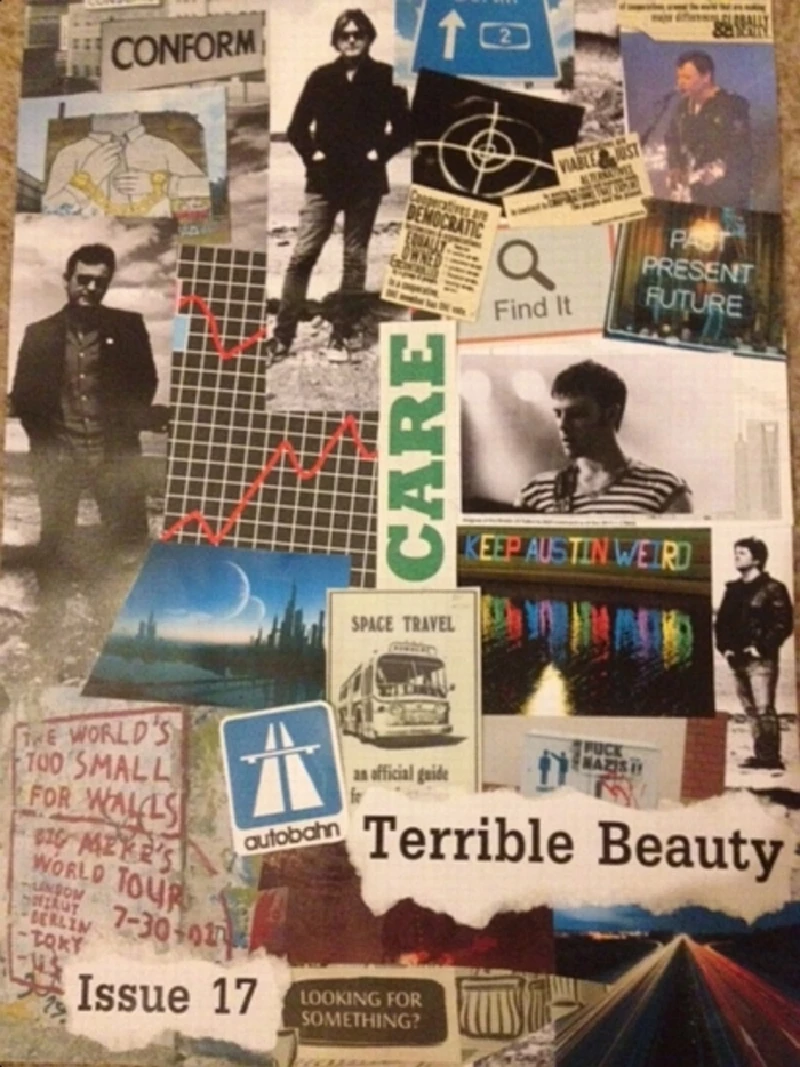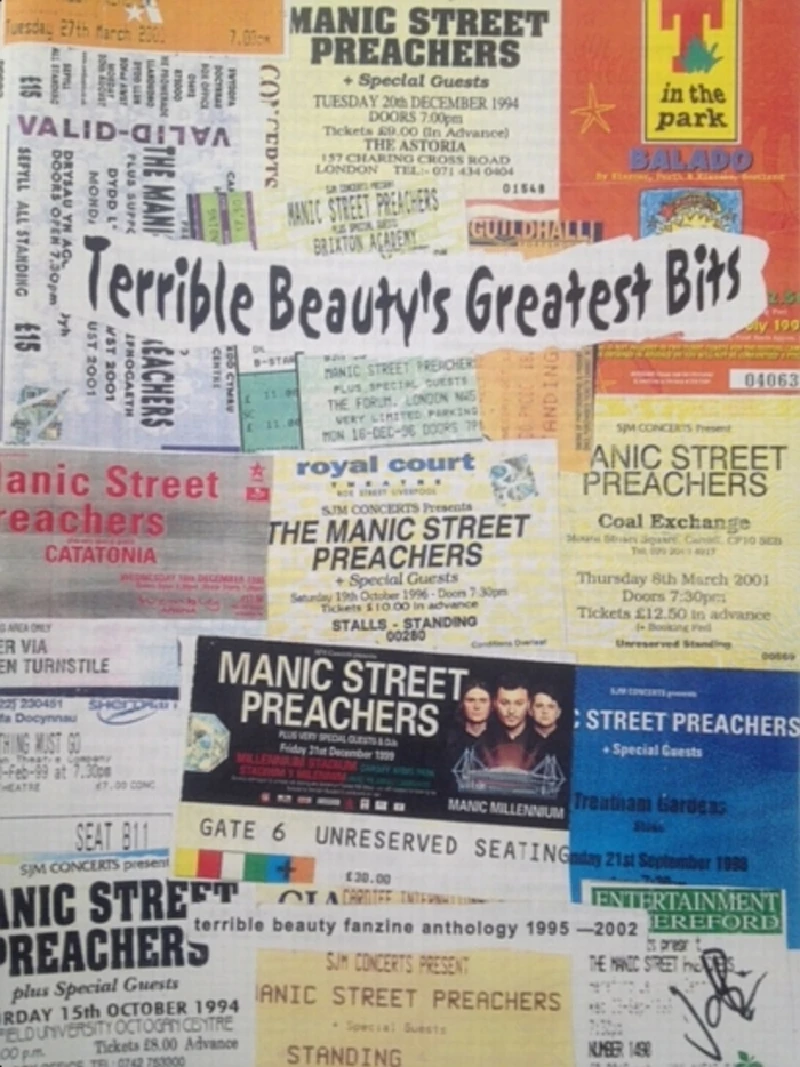Miscellaneous - Profile
by Mary O'Meara
published: 18 / 4 / 2015

intro
Mary O' Meara examines and reflects upon the still thriving world of the printed fanzine
Back at the tail-end of the nineties, I co-organized an event called ‘The Welsh Assembly’ ( a fundraiser for Kosovo Crisis Appeal) in the shape of a Manic Street Preachers’ fan convention. It was a hugely heart-warming event that lasted from midday to midnight with a host of activities and entertainment that stretched from the Sherman Theatre to Cardiff University's Great Hall. I mention this because fanzines played a pivotal role in the event. Without the power of those home-spun, stapled sheets of words, images, slogans and most importantly, passion, I don't think an event like ‘The Welsh Assembly’ could have manifested the way it did. I remember standing in the Sherman Theatre that Saturday and scanning the vast array of fanzine stalls that had gathered together - there must have been 20 or so - all inspired by that band, all having something to say, all bursting with creativity and written from the heart. The Manics had always had a strong fanzine culture - almost from the word go. In fact, Jacqui and Carrie who later became the band Shampoo were responsible for one of their first fanzines, ‘Last Exit’. There were many others in those early days such as ‘Stay Beautiful’ and ‘Assassinated Beauty’ that focused on the band, and others like ‘Cultural Apocalypse’ that were more diverse and incorporated a wider subculture and politics. For many years, new MSP fanzines emerged and others folded but at any one time, for the best part of a decade, a vibrant ‘zine scene blossomed around the band, culminating in events like the ‘Welsh Assembly’. Although the internet was beginning to have a presence in everyday life and the facility of email was an option for some, for the most part this was a world that revolved around hand-written letters and postcards, glitter and stickers, manifestos typed on old-fashioned typewriters rather than glaring screens. Even mobile phones were rare and text messaging was only entering the picture. Yet, we fans mobilised. We were frequently in touch with each other by letter and via discussion in the fanzines themselves, which were platforms/parchments for pouring your feelings out on/in. I'm not against the digital age but I do think it hampers communication in the same click as it facilitates it. Slickness and solo scrolling are somehow the antithesis of community and cohesion. The paper pages invite physical participation - printed fanzines are as flesh and blood as it gets! Fanzines speak to fans in their very own language. It's like a secret club where the only membership criteria is that you share the same passion for the subject matter - be that football, music, sci-fi or political/cultural movement that has a devoted audience or following. The devotion is important because fanzines run deep. It's not about the surface or the mainstream view. Fanzines delve between the lines. Typography can be cut and paste literally from mainstream media but with a completely different intent and tone. Fanzines can be hand-written and can feel like you’re reading somebody's diary. They reach an intimacy with their readers the traditional press can never come close to. The true wonder and excitement of fanzines is that anyone can make one and one can reach anyone. There are no rules. There is little, if any, censorship. There is a freedom that lends itself to sometimes some remarkable and impassioned writing. It's interesting that two of the most esteemed and widely celebrated music journalists I can think of - Lester Bangs and Greil Marcus - both began their journalistic journeys via fanzines. Perhaps that's why their voices are so radical. They didn't have to adhere to the dictatorial restraints of some media houses. The other thing that sets fanzines apart from mainstream publishing is they are generally not-for-profit ventures. Most fanzine editors try to cover the costs of photocopying and postage and hope to break even, if even that. The fact that printed fanzines require so much time, effort, patience with no commercial gain only goes to show that they are labours of love. The rewarding part is being able to channel collective feelings and thoughts into those pages and document the lives of ordinary people in a medium that tends to capture those magical, ephemeral pieces of fandom, the significant fragments and angles the traditional press rarely engage with. Many would expect the internet to have killed the fanzine and certainly in the world of Manic Street Preachers ‘zines, I’ve returned to a very different world than the one I left twelve years ago where blogging and webzines appear to have taken over. Yet, the printed fanzine world in general is thriving. There are ‘zine libraries and ‘zine festivals all over the world and the range of ‘zines available is more diverse than ever. Perhaps it has something to do with the current political climate, the disillusion, the economic recession and cuts to arts funding, but many people are looking for an alternative, something real, something that speaks to them in a language they understand, something they can add their voice to, to feel a sense of belonging or be inspired to create their own fanzine. Sales of the ‘NME’ are at an all-time low and a flick through a copy at the newsagents easily explains why. Fanzines have always filled a gap that the mass media press barely recognise. I feel that gap has grown into a gulf in recent times. Thankfully we don’t need to rely on corporate publishing to tell our tales. We can share our experiences and discuss the music we love and issues we care about via both the web on sites such as this, along with the humble printed fanzine. Fanzines can be fun, irreverent, intense, controversial and sometimes strikingly beautiful. They are rarely dull because they’re written from the heart. They inspire because they’re written with conviction and imagination. If you stopped buying/reading the music press years ago and want a break from trawling the net, consider delving into the wonder-world of fanzines. You might even be inspired to start your own band... “This is a chord. This is another. This is a third. Now form a band!," famously proclaimed ‘Sideburns’ fanzine in 1977. Yes, why not? Sometimes it’s simpler than we think to do the things we love. Fanzines can empower and foster creativity and self-belief. Long may they flourish! Mary O’ Meara recently published the latest edition of ‘Terrible Beauty’, her Manic Street Preachers fanzine, and its first new edition in twelve years. More information about ‘Terrible Beauty’ can be found at https://www.facebook.com/terriblebeautyfanzine and terrible_beauty@outlook.com
Article Links:-
https://www.facebook.com/terriblebeautyfanzinePicture Gallery:-

most viewed articles
current edition
Carl Ewens - David Bowie 1964 to 1982 On Track: Every Album, Every SongArmory Show - Interview with Richard Jobson
John McKay - Interview
Colin Blunstone - Thalia Hall, Chicago, 16/7/2025
Billie Eilish - O2 Arena, London, 10/7/2025
Bathers - Photoscapes 1
Visor Fest - Valencia, Spain, 26/9/2025...27/9/2025
Loft - Interview
Sir Tim Rice - Interview
Robert Forster - Interview
previous editions
Manic Street Preachers - (Gig of a Lifetime) Millennium Stadium, Cardiff, December 1999Heavenly - P.U.N.K. Girl EP
Beautiful South - Ten Songs That Made Me Love...
Oasis - Oasis, Earl's Court, London, 1995
Peter Perrett - In Dreams Begin Responsibilities Interview Part One
Boomtown Rats - Ten Songs That Made Me Love....
Prolapse - Interview
Coldplay - Wembley Arena. London, 16/8/2022
Pixies - Ten Songs That Made Me Love...
Trudie Myerscough-Harris - Interview
most viewed reviews
current edition
Davey Woodward - Mumbo in the JumboSick Man of Europe - The Sick Man of Europe
Lucy Spraggan - Other Sides of the Moon
Amy Macdonald - Is This What You've Been Waiting For?
Phew, Erika Kobayashi,, Dieter Moebius - Radium Girls
Bush - I Beat Loneliness
Suzanne Vega - Flying With Angels
Alice Cooper - The Revenge of Alice Cooper
Blueboy - 2
Cynthia Erivo - I Forgive You
Pennyblackmusic Regular Contributors
Adrian Janes
Amanda J. Window
Andrew Twambley
Anthony Dhanendran
Benjamin Howarth
Cila Warncke
Daniel Cressey
Darren Aston
Dastardly
Dave Goodwin
Denzil Watson
Dominic B. Simpson
Eoghan Lyng
Fiona Hutchings
Harry Sherriff
Helen Tipping
Jamie Rowland
John Clarkson
Julie Cruickshank
Kimberly Bright
Lisa Torem
Maarten Schiethart